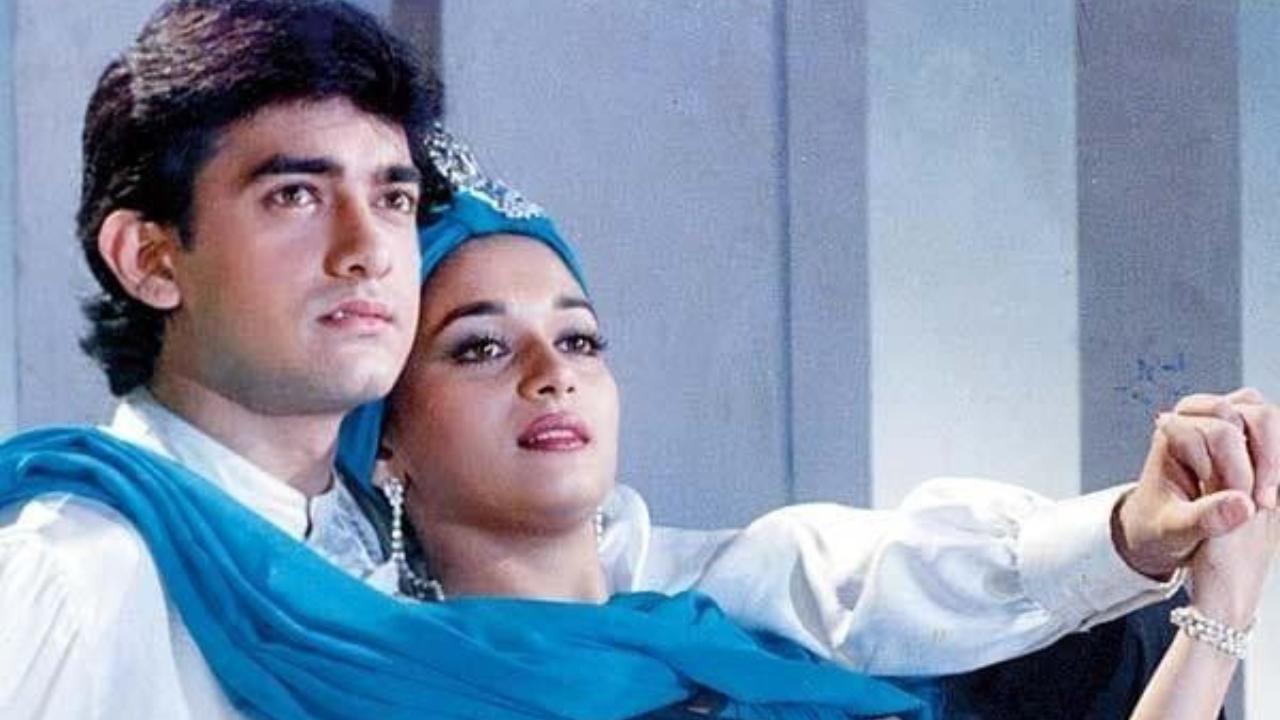
In the vibrant world of cinema, certain films manage to transcend time, leaving an indelible mark on the hearts of audiences. One such film is ‘Dil,’ the charming romantic drama that continues to enchant viewers even 34 years after its release. Starring the charismatic Aamir Khan and the radiant Madhuri Dixit, ‘Dil’ debuted in theaters in 1990 and quickly soared to cult status. As we commemorate this iconic film’s 34th anniversary, it’s evident that its appeal lies in its timeless love story, unforgettable music, and memorable dialogues.
When it first graced the silver screen in the 1990s, ‘Dil’ was nothing short of a cinematic phenomenon. Directed by Indra Kumar, marking his directorial debut, the film carved out a unique space for itself amid the myriad love stories of Bollywood. What set ‘Dil’ apart was its purity and authenticity—a straightforward yet touching love story that resonated deeply with audiences. The chemistry between Aamir Khan and Madhuri Dixit was electric, and their performances turned them into overnight sensations.
Aamir Khan, with his boy-next-door charm and affable style, struck a chord with the audience, and Madhuri Dixit’s magnetic screen presence and grace won hearts across the nation. The duo’s portrayal of lovers navigating the trials and tribulations of their relationship captivated viewers, making ‘Dil’ a quintessential romantic drama that stood out in an era of melodramatic tales.
But the magic of ‘Dil’ was not limited to its lead pair alone. The film’s success was amplified by its soulful and catchy soundtrack, composed by the dynamic duo Anand-Milind. The film featured lyrics penned by the talented Sameer, whose words resonated with the emotions of love, longing, and youthful exuberance. Among the many memorable songs, “Mujhe Neend Na Aaye” and “Khambe Jaise Khadi Hai” became instant hits, setting trends and dominating the music charts of the time. The songs’ popularity translated into staggering sales figures for music cassettes, a testament to their lasting appeal.
Notably, “O Priyaa Priyaa” deserves special mention. Originally composed by the legendary Ilaiyaraaja and sung melodiously by Chithra and S.
. P. Balasubrahmanyam for the Telugu film ‘Geethanjali,’ the track found its way into the hearts of Hindi-speaking audiences through ‘Dil.’ It was an intelligent fusion of regional musical excellence with mainstream Bollywood, adding another feather to the film’s cap.
The universal love for ‘Dil’ was evident not just in the box office numbers but in the high praise it garnered from critics as well. As the highest-grossing film of 1990, ‘Dil’ established Indra Kumar as a formidable director in the industry. Critics lauded the film’s engaging narrative, its melodic soundtrack, and the stellar performances by the cast. The screenplay, crafted by Naushir Khatau and Kamlesh Pandey, was praised for its depth and emotional resonance.
‘Dil’ went on to inspire remakes in other languages, broadening its influence. In 1993, the film was remade in Telugu as ‘Tholi Muddu,’ and in 1997, it appeared as ‘Shivaranjani’ in Kannada. Both remakes captured the essence of the original, reflecting the universal appeal of the story and its characters.
While ‘Dil’ remains a beloved classic, its stars have continued to make significant contributions to the world of cinema. Aamir Khan was last seen in the film ‘Laal Singh Chaddha,’ a Hindi adaptation of the Hollywood classic ‘Forrest Gump.’ The actor-producer continues to push the envelope with his projects, recently announcing his production ‘Lahore 1947,’ featuring Sunny Deol in the lead role.
As ‘Dil’ celebrates its 34th anniversary, we are reminded of the magic and charm that classic love stories bring to our lives. The film’s timeless appeal lies in its honest portrayal of love, its melodious music, and the unforgettable performances by its lead actors. It stands as a testament to the enduring power of cinema to capture human emotions and etch them into the collective memory of generations. Here’s to ‘Dil,’ a film that continues to live on in our hearts, reminding us of the simple yet profound joy of love and its cinematic celebration.












